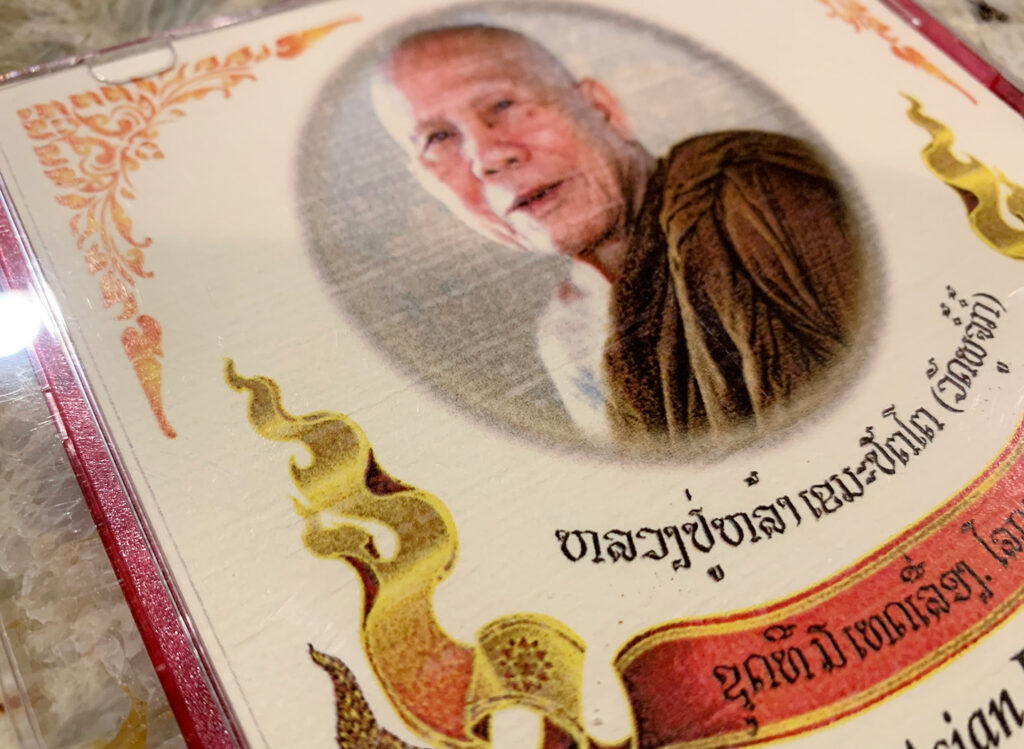COMMUNITY CHANNEL:
Wat Buddha Samakidham
The ARSP began fieldwork at Wat Buddha Samakidham in 2015, primarily recording worship services and festivals (listen to our recordings of a Sunday service and of the 2016 Vaisakhi Puja). Every evening, the monks perform evening prayers and meditation, and on Wednesdays, they do so in the company of a few guests. Approximately 15 minutes of chanting in Pali language are followed by 20 minutes of silent meditation; afterward, a few brief prayers close out the session and the monks spend time chatting with community members. On Sunday mornings, about 50 members of Columbus’ Thai and Lao community typically gather at the temple for prayer, offerings, and a meal. Many more tend to visit the temple during holidays and festivals.
We followed up with Wat Buddha Samakidham in autumn 2021 to learn how the community – and the religious sounds traditionally heard there – had been impacted by the COVID-19 pandemic. When in-person worship was no longer safe, the temple made numerous efforts to stay connected with community members. For instance, the local Lao community sponsored Wat Buddha Samakidham monks to create a CD of Buddhist teachings for distribution, which people could listen to in their homes or cars, explained Boun-Thanh Phommasathit, the temple secretary. An excerpt from the four-edition CD – titled The Principles of Buddhism, Meditation of the Individual, and How an Individual Learns to Let Go of Suffering – follows.

Excerpt from The Principles of Buddhism, Meditation of the Individual, and How an Individual Learns to Let Go of Suffering, pictured here, which was provided as a CD to Wat Buddha Samakidham members when they were unable to meet at the temple.
We spoke with Boun-Thanh, who detailed some of the other ways the pandemic affected Wat Buddha Samakidham and its members. The audio and text here have been edited for clarity and brevity.
ARSP: Please tell us a little bit about yourself.
BOUN-THANH: I’ve been Buddhist since I was born, and even my parents were Buddhist. We were baptized as Christian in the refugee camp and in the U.S. Years later, we did not continue to go to the Christian church. Finally, we [the Lao community] found a place to go and established a temple. Many of our Lao community – 75 percent – are Buddhist.
ARSP: What kinds of sounds are significant to you in your religious community?
BOUN-THANH: I love when the monks chant, even though I do not understand. Most of the congregation would be at the same level as I am. But I understand that it is meditation. It’s connection, and it calms you down once a week. On Sunday, my husband and I do not do anything but come to the temple.
ARSP: What has been the impact of COVID-19 on Wat Buddha Samakidham?
BOUN-THANH: Oh my god. It’s a huge difference. Before COVID, this temple was always packed. The elderly came together and they did activities together. They made decorations together. After the COVID pandemic started, there were quite a few elderly people from here who passed away and the gatherings were smaller. At the monks’ residence – monks don’t cook for themselves unless it’s necessary. Women or men brought food over, and we used to set it out and serve the food to the monks. Now, everybody puts food in a container, packs it individually, leaves it on a table, and they serve themselves.
ARSP: Has it been effective to use virtual gatherings or materials as alternatives to meeting in person?
BOUN-THANH: People want to see and touch. There’s not much of that electronically. Parjan (sp?) tried everything: He tried Zoom, he tried Google Meet, he tried posting chanting on Facebook. None of it worked. People want to come to the temple. Now, look what happened. Because of that, people seem not to come to the temple on a regular basis. Attendance has reduced down dramatically, I would say about 75 percent. But they come to the bigger events, like the last day of Buddhist lent. They think, “If it’s not a big event, it’s not a big deal.”
ARSP: Did you have doctors or medical advisers helping you make decisions about when to re-open or how many people could be here? Who was making those decisions?
BOUN-THANH: We watch the governor’s orders, and that’s all we do. Usually they send it in an email from the Department of Health. Rev. Sun, he watches TV of course, and says okay, we need to reduce our capacity or whatnot.
ARSP: Is there anything you’d like to add?
BOUN-THANH: There is a lot of death and dying. We have lost a lot of members. So far, we have 11 deaths. Eleven. Sometimes, one month, we would get back-to-back deaths. Every single week, people died. There’s young and old. Even young people lost their lives to COVID. Even people in their 40s. So, we lost a lot of members in the community. But we try.
One additional pandemic initiative of Wat Buddha Samakidham is a family assistance program, where members of the temple regularly donate money to help families who lose loved ones to COVID. These funds help offset the often-prohibitive costs of a funeral, allowing surviving family members to focus on grieving and taking care of each other. The program is ongoing.